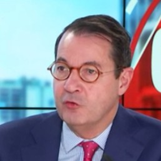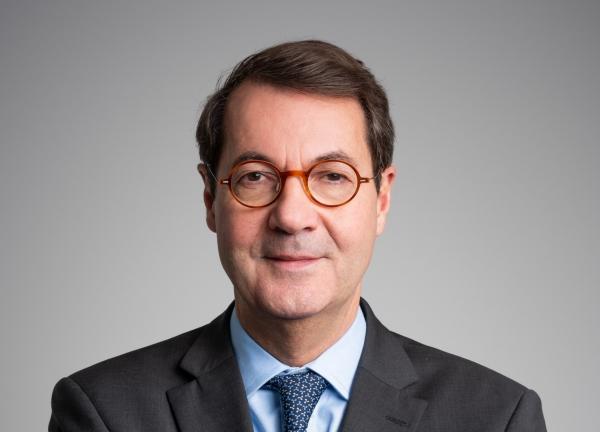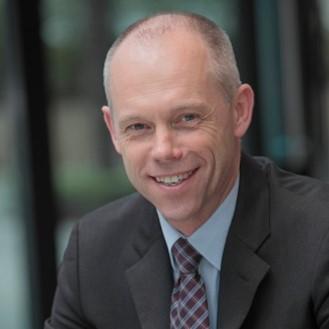GUBERNA Alumni Sparkles - Bruno Colmant
Diversity is the only way to make sure we create awareness around the world
If in the past banks would have been considered just as money makers, now they must play a role in the transition the world is going through.
Bruno Colmant has experiences in both parts: the business & the academic world. Consequently, his views on governance topics are very original. His long experience with GUBERNA also gives us the opportunity to share insides.
Considering where GUBERNA started at his foundation, and what GUBERNA is today, the success GUBERNA has achieved is amazing.

Prof. Dr. Bruno Colmant
Group CEO Degroof Petercam- Member of the Belgian Royal Academy
Vice Chairman of GUBERNA Alumni Council
+32 499 07 33 90
Contact by email
You are well known as CEO of DeGroof Petercam, especially in the French speaking part of Belgium. Many Alumni colleagues were pleasantly surprised to have such an experienced person becoming Vice Chairman of the GUBERNA Alumni. What is your driver to become Vice Chairman and how do you intend to support the Alumni organisation?
I have a long story with GUBERNA as one of the so-called founding fathers of the institute. At the time we decided to merge the French & Dutch speaking organisations in one new GUBERNA. As such I have been board member of GUBERNA for 11 years already. I stepped down 2 years ago, and I wanted to serve GUBERNA in another position. That’s why today I am proud to become Vice Chairman of the Alumni Council.
I intend to devote time and energy in this new position. I strongly believe in GUBERNA as it conveys strong values I adhere to and actively promote in my business roles. As I have been an active teacher as part of the GUBERNA education programmes, for me, it is a long-lasting story, and I am quite pleased and honoured to have been accepted in this new position.
Can you introduce yourself and the context in which you execute your role and mandates?
In addition to my role as CEO of Degroof Petercam, I have two board mandates, namely Brederode & Unibra. I also try to publish academic research I carried out in the frame of my PhD research. Having written a certain number of articles on governance, I try to bring a synthesis of my ideas and experiences around this topic. Basically, I consider myself as trying to promote relevant ideas learned from past mentors and to put into practice in the day-to-day business reality good practices gathered from my business experience and academic life.

As CEO of Degroof Petercam, what means good governance to you and more specifically in the financial world?
I would like to give you a two-tier answer. What has changed in the banking, and more general speaking the financial world, is that since the crisis of 2008, banks are more aware of corporate governance sensibility. As you remember, many banks were at the brink of bankruptcy only 13 years ago. Today big banks are integral part of the global economy. The stakeholders are different because the government is involved, and because their social responsibility in protecting public savings is more important than before. The way they are being managed is quite different. Degroof Petercam, it’s a different kind of story because it’s a family-owned company. It means that governance rules strictly abide to the banking regulation, but also respect the family links that hold the company together since its inception 150 years ago. The deep roots of the company and its DNA adds an additional dimension that needs to be well understood and implemented throughout the company.
Given the COVID crisis and the many questions on sustainable entrepreneurship, with your experience, how can the financial world and their directors add value in those changing times?
The financial sector is a very important world player. Like any company, we had to demonstrate agility and adapt to the new situation: adjust our way of working, start working remotely, create new ways of building relationships with our clients. The most important lesson that I take away is that we understand that as individuals we are all part of a global picture. What is changing in banks, is the nature of the financial solutions we bring to our clients. Day by day, more of them are properly enabled as being corporate responsible, and we see a demand from the majority of our clients, not only from the young generations, to make sure that the investments they make, do make sense from a societal point of view. Banks have a very important role to play, and we want to be an active promoter of this. This is also tending to demonstrate that banks face today more stakeholders than ever before. If in the past banks would have been considered just as money makers, today they are expected to be actively involved in the transition the world is going through.
Does that mean you take tougher decisions based on new criteria then you did 5 to 10 years ago? And that maybe not every customer is a good customer anymore?
No, I would not say this. Of course, if we focus on our clients, we are like any other bank subject to new regulation and we have to appropriately document the accounts of our clients. This has changed since 15 years ago. But when I focus on the solutions we are offering, I would say that the demand matches the offer. There is a shift in the way people want to invest their money. Don’t forget, Degroof Petercam is a company that handles funds in an off-balance sheet way, so we are not a retail bank. Our role is to make sure that the money is invested wisely across generations and we see the shift happening. So, there is no disruption at all. It’s more making sure that our product offering meets the demands of our clients. And this is a success because people today are aware that selfishness does not make any sense if you want to invest money because at some point in time, a selfish investment will lead nowhere. This is what I consider to be good evolution and in the best collective interest.

With your tremendous experience, if there’s one thing, given the current situation, you’d like to change or transform in corporate governance, what would that be?
The pandemic that we are facing today is a game changer because it is something that could have been predicted but that nobody wanted to happen. It is the proof that when you manage a company, you must in a continuous, on-going way think the unthinkable. We can’t take anything for granted. This is very important. We will be facing new shocks in the economy, we will endure climate changes and energy shocks in the future, and we could face social unrest. We could have multiple positive and negative things effectively affecting our companies. When you are sitting on a board, you can no longer think in a linear way because the volatility of the world is changing. It requires extra efforts because people don’t want to jeopardise or to challenge the old way of thinking. It is easier to think that the future will be a linear evolution of the past. This is no longer the case. We are reaching a disruption point and that’s a good lesson for all board members of every company.
As GUBERNA Certified Director and as one of the founders of GUBERNA, how is GUBERNA inspiring and helping you to execute your responsibilities?
To me, GUBERNA is playing a major role in the Belgian economy and even beyond our borders. What is amazing about this organisation is that in 2007 the decision was made to join the forces of two organisations that were following the same goal: the promotion of good governance practices. This has been a success. It was a good decision to unite by joining forces, today GUBERNA is setting the standards for governance practices. It is also offering an effective way to learn, to share knowledge, to make sure a strong link exists with the academic world.
When I see what GUBERNA was in its early days, and what it has become, the success that has been achieved is truly amazing. I must say that the credibility and impact of GUBERNA has also increased. When you see all the people that have been certified, plus all the people who have participated to the GUBERNA learning programmes and all the boards in which GUBERNA members are currently active, it’s astonishing. This is an evolution that nobody could have predicted when we initially created this organisation. Definitely, I am grateful to all the people who have participated to this achievement. This is the reason why I wanted to re-join GUBERNA because if one can bring something additional, one should do it.
What is still work in progress to have more awareness on who is GUBERNA and what they are doing? Is there anything specific that you could contribute to further improve awareness?
I want to be involved in the GUBERNA education programmes and I also want to deploy the awareness of GUBERNA in the best possible way. Because I believe in GUBERNA and I feel that it is the responsibility of everyone in the GUBERNA network to be a good ambassador. The more we promote GUBERNA within and outside the organisation, the more its credibility will increase. GUBERNA can become a self-fulfilling prophesy: the more it is being promoted, the more the standards it is setting will be taken over and at some point, in time, as already observed today, GUBERNA is the only speaking party able to reasonably discuss governance issues. This is only one of major achievements, thanks to amongst others Prof Lutgart Van den Berghe. Her expertise and experience are so valuable that she was one of the people being questioned by the government in debates on governance. I want to be part of this evolution.
Looking at the changes we have in the boardroom, the mix of people, what tips do you have?
Belgium has suffered too long from the lack of diversity and this has led to a number of mistakes in our Belgian economy. If we take a look back, we see that in the last 40 years we have lost multiple decision centres because we’ve nurtured the idea that we were the champions of the world. And then the troubles started to take place, we have been through major waves of take overs, and today we realise more than ever that we are a very open economy. I must say that this has been better understood more swiftly and deeply in the Northern part of our country, than in the Southern part. But today diversity is the name of the game. I see it with Degroof Petercam, we are quite a traditional company, which is still too French speaking. We hire about 10% of our total workforce every year and we put a lot of emphasis on diversity, not only gender. And we see that the company is changing fast because of this diversity. Diversity is the only way to make sure we create awareness on how the world changes. I strongly believe in that.
Towards the interview

About the interviewer
This interview has been realised by Jo Benoit
Vice President & General Manager at Angelini Pharma
Chairman GUBERNA Alumni Council
+33 6 30 55 23 14
Contact by email
Want to contribute to GUBERNA Alumni Sparkles?
GUBERNA wants to be a true community in which each member can perform his/her role as director in the best conditions.
To encourage the exchange of experiences and knowledge, the GUBERNA Alumni have launched an interview series: GUBERNA Alumni Sparkles. Through the stories of experienced directors, we want to inspire our members.
Would you like to contribute to GUBERNA Alumni Sparkles or do you have suggestions for interviewees or topics? Please send an email to Danny Vandevyver.
